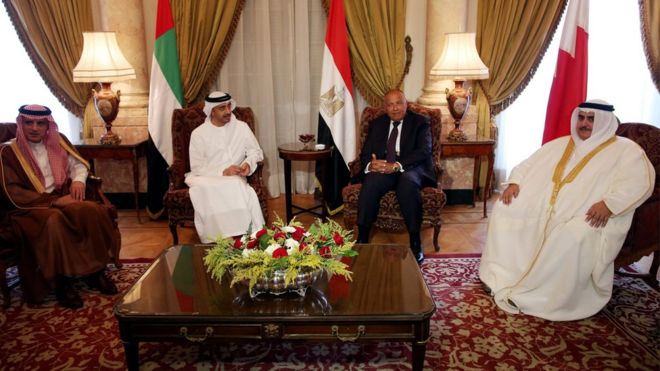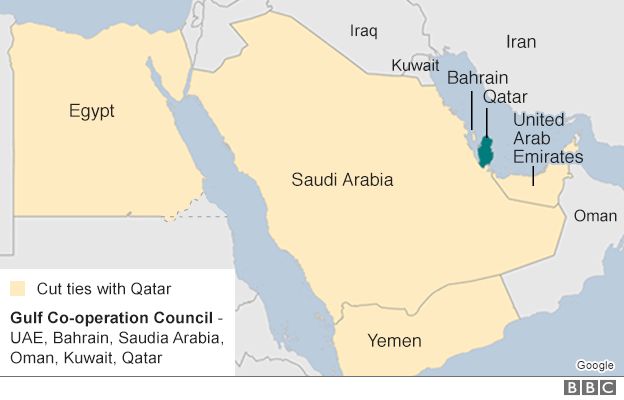Qatar crisis: Restrictions to continue, Saudi Arabia says
 REUTERS
REUTERS
Restrictions on Qatar will continue after it rejected the ultimatum made by its Middle East neighbours, Saudi Arabia has said.
The foreign ministers of four Arab countries, meeting in Cairo, said they regretted Qatar's "negative" response to their list of demands.
Saudi Arabia, Egypt, Bahrain and the UAE severed ties with Qatar last month.
They accuse it of supporting jihadi groups, and called for major changes in its policies.
The diplomats said Qatar lacked "understanding of the seriousness and gravity of the situation".

The Saudi foreign minister said further steps would be taken against Qatar at the appropriate time, and would be in line with international law.
"We're not doing this because we want to hurt Qatar, we're doing this to help Qatar," Adel bin Ahmed al-Jubeir said.
The meeting came as the deadline for Qatar to accept the list of demands or face further sanctions expired.
The bloc's demands to Qatar include shutting down the Al Jazeera channel and scaling down ties with Iran, as well as handing over individuals wanted for terrorism and aligning itself politically and economically Gulf Co-operation Council (GCC).

Speaking in London before the four ministers' statement, the Qatari Foreign Minister Sheikh Mohammed bin Abdulrahman al-Thani described the cutting of ties with his country as "a siege that is a clear aggression and an insult".
"The answer to our disagreement is not blockades and ultimatums, it is dialogue and reason," he added.
The small oil- and gas-rich nation is dependent on imports to meet the basic needs of its population of 2.7 million.
As its only land border is now closed, food is having to be shipped or flown in.
Mr Thani said this could be sustained "indefinitely".

Analysis - by Frank Gardner, security correspondent, BBC News
The window for dialogue to resolve this dispute is not yet completely shut but it is fast heading that way.
Qatar has refused to comply with the 13 demands made by the Saudi-led quartet, so now the ball is in their court. They have three possible courses of action:
- Drop the sanctions against Qatar. This would be a massive climbdown and Arab ministers have already said the sanctions stay, for now.
- Increase the sanctions. This is quite likely, if only to save face. They could include financial restrictions on flows of Qatari money. Military action would be a disastrous last resort but another worrying possibility hinted at by UAE spokesmen is secondary sanctions: forcing countries to choose between doing business with the Saudi-led quartet or with Qatar.
- Do nothing, but keep sanctions in place. Although painful for Qatar, and harmful to the wider GCC, this would at least allow a cooling-off period after which some kind of compromise may be possible.

How did we get here?
- 5 June: A number of Arab countries including Saudi Arabia and Egypt cut diplomatic ties with Qatar, accusing it of destabilising the region. Measures include closing airspace to Qatar Airways
- 8 June: Qatar vows it will "not surrender" the independence of its foreign policy amid US calls for Gulf unity
- 23 June: Qatar is given 10 days to comply with a 13-point list of demands, including shutting down the Al Jazeera news network, closing a Turkish military base, cutting ties with the Muslim Brotherhood, and curbing diplomatic relations with Iran
- 1 July: Qatar's foreign minister says the state has rejected the demands, but is ready to engage in dialogue under the right conditions
- 3 July: Saudi Arabia and its allies extend by 48 hours the deadline for Qatar to accept their list of demands


Post a Comment